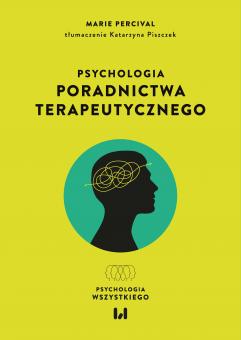-
2364
-
1486
-
1328
-
1191
-
1055
Psychologia poradnictwa terapeutycznego
Pliki do pobrania
Co to jest poradnictwo terapeutyczne i w jaki sposób może nam pomagać? Czym różni się od rozmów o problemach, które prowadzimy z rodziną i przyjaciółmi?
Psychologia poradnictwa terapeutycznego zawiera wyjaśnienie różnych podejść do terapii i ukazuje ich zastosowanie w praktyce. Dostarcza informacji, w jakich przypadkach terapia może być pomocna, a w jakich nie. Umożliwia przyjrzenie się terapiom poznawczym i behawioralnym, psychoanalizie i psychologii humanistycznej, a także zgłębienie pozytywnej psychoterapii oraz zjawiska polegającego na rezygnacji z podejścia opartego na chorobie, by zwrócić się w kierunku terapii. Książka zawiera refleksje nad szerokim spektrum przestrzeni terapeutycznych i rozważania dotyczące takich kwestii profesjonalizmu w terapii, jak etyka, superwizja czy należyta staranność postępowania wobec klientów.
Współcześnie, kiedy głównym tematem rozmów jest zdrowie i dobre samopoczucie, prezentowana publikacja rzuca nowe światło na proces terapeutyczny. Pozwala zrozumieć, co on obejmuje i jak działa, by pomóc osobom poszukującym wsparcia w rozwiązaniu problemów natury emocjonalnej i psychicznej oraz polepszyć ich kondycję psychiczną.
Marie Percival jest wykładowczynią akademicką, praktykującą lekarką i badaczką. Posiada rozległą wiedzę i ponad piętnastoletnie doświadczenie w zakresie nauczania psychologii i terapii psychologicznych na studiach licencjackich oraz magisterskich wyższych uczelni, a także w prowadzeniu niezliczonej liczby klientów.
American Psychiatric Association (2013). Diagnostic and statistical manual of mental disorders, fifth edition (DSM-5(TM)) (wyd. 5). American Psychiatric Publishing.
Banks, J. (2018). The human touch: Practical and ethical implications of putting AI and robotics to work for patients. IEEE Pulse, 9(3), 15–18. https://doi.org/10.1109/mpul.2018.2814238
Barker, G. G., Barker, E. E. (2021). Online therapy: Lessons learned from the COVID-19 health crisis. British Journal of Guidance & Counselling, 50(1), 66–81. https://doi.org/10.1080/03069885.2021.1889462
Barker, M., Vossler, A., Langdridge, D., Barker, M. (2010). Understanding counselling and psychotherapy (published in association with the Open University). SAGE Publications Ltd.
Baumeister, R. F., Bratslavsky, E., Finkenauer, C., Vohs, K. D. (2001). Bad is stronger than good. Review of General Psychology, 5(4), 323–370. https://doi.org/10.1037/1089-2680.5.4.323
Beck, A. T., Rush, J. A., Shaw, B. F., Emery, G. (1987). Cognitive therapy of depression (The Guilford Clinical Psychology and Psychopathology Series). Guilford Press.
Beck, J. S., Beck, A. T. (2020). Cognitive behavior therapy: Basics and beyond (wyd. 3). The Guilford Press [wyd. polskie: J. S. Beck, A. T. Beck (2020). Terapia poznawczo-behawioralna: podstawy i zagadnienia szczegółowe. Wydawnictwo Uniwersytetu Jagiellońskiego].
Bethell, C., Jones, J., Gombojav, N., Linkenbach, J., Sege, R. (2019). Positive childhood experiences and adult mental and relational health in a statewide sample. JAMA Pediatrics, 173(11), e193007. https://doi.org/10.1001/jamapediatrics.2019.3007
British Association for Counselling and Psychotherapy (2013). BACP. Definition of Counselling. Lutterworth. http://www.bacp.co.uk (dostęp: 4.01.2022).
Carver, C. S., Scheier, M. F., Segerstrom, S. C. (2010). Optimism. Clinical Psychology Review, 30(7), 879–889. https://doi.org/10.1016/j.cpr.2010.01.006
Chaudhury, P., Banerjee, D. (2020). Recovering with nature: A review of ecotherapy and implications for the COVID-19 pandemic. Frontiers in Public Health, 8. https://doi.org/10.3389/fpubh.2020.604440
Claringbull, N. (2010). What is counselling and psychotherapy? (Counselling and Psychotherapy Practice Series). Learning Matters.
Clements-Hickman, A. L., Reese, R. J. (2022). The person of the therapist: Therapists’ personal characteristics as predictors of alliance and treatment outcomes. Psychotherapy Research, 1–12. https://doi.org/10.1080/10503307.2022.2080610
Clinebell, H. (1996). Ecotherapy: Healing ourselves, healing the Earth. Routledge.
Cooper, M. (2008). Essential research findings in counselling and psychotherapy: The facts are friendly. Sage Pubns (in association with BACP).
Cooper, M., Dryden, W. (2016). The handbook of pluralistic counselling and psychotherapy. SAGE Publications.
Cooper, M., McLeod, J. (2007). A pluralistic framework for counselling and psychotherapy: Implications for research. Counselling and Psychotherapy Research, 7(3), 135–143. https://doi.org/10.1080/14733140701566282
Coventry, P. A., Brown, J., Pervin, J., Brabyn, S., Pateman, R., Breedvelt, J., …, White, P. (2021). Nature-based outdoor activities for mental and physical health: Systematic review and meta-analysis. SSM – Population Health, 16, 100934. https://doi.org/10.1016/j.ssmph.2021.100934
Crocq, M. A., Crocq, L. (2000). From shell shock and war neurosis to posttraumatic stress disorder: A history of psychotraumatology. Dialogues in Clinical Neuroscience, 2(1), 47–55. https://doi.org/10.31887/dcns.2000.2.1/macrocq
Csikszentmihalyi, M. (2008). Flow: The psychology of optimal experience. Harper Perennial Modern Classics [wyd. polskie: M. Csíkszentmihályi (1997). Przepływ. Psychologia optymalnego doświadczenia. Studio Emka].
Ellis, A., Ellis, D. J. (2011). Rational emotive behavior therapy (theories of psychotherapy). American Psychological Association.
Eysenck, H. (2004). Decline and fall of the Freudian empire (wyd. 2). Viking Press [wyd. polskie: H. Eysenck (2002). Zmierzch i upadek imperium Freuda. WiR Partner].
Felitti, V. J., Anda, R. F., Nordenberg, D., Williamson, D. F., Spitz, A. M., …, Marks, J. S. (1998). Relationship of childhood abuse and household dysfunction to many of the leading causes of death in adults. American Journal of Preventive Medicine, 14(4), 245–258. https://doi.org/10.1016/s0749-3797(98)00017-8
Figley, C. R. (2015). Treating compassion fatigue (Brunner-Routledge Psychosocial Stress). Routledge.
Finnerty, M., Kearns, C., O’Regan, D. (2018). Pluralism: An ethical commitment to dialogue and collaboration. IACP. https://iacp.ie/files/UserFiles/IJCP-Articles/IJCP-Articles-2018/Pluralism-An-ethical-commitment-to-dialogue-and-collaboration-by-Dr.M.Finnerty-Caitriona-Kearns-and-David-ORegan.pdf (dostęp: 2.01.2022).
Fischer, B. A. (2012). A review of American psychiatry through its diagnoses. Journal of Nervous & Mental Disease, 200(12), 1022–1030. https://doi.org/10.1097/nmd.0b013e318275cf19
Gay, P. (1998). Freud: A life for our time. W. W. Norton & Company [wyd. polskie: P. Gay (2013). Freud. Życie na miarę epoki. Zysk i S-ka].
Gravetter, F. J., Forzano, L. B. (2011). Research methods for the behavioural sciences (wyd. 4). Cengage Learning.
Greenberger, D., Padesky, C. A., Beck, A. T. (2015). Mind over mood, second edition: Change how you feel by changing the way you think (wyd. 2). Guilford Press [wyd. polskie: D. Greenberger, C. Padesky (2015). Umysł ponad nastrojem. Wydawnictwo Uniwersytetu Jagiellońskiego].
Halgin, R. P., Caron, M. (1991). To treat or not to treat: Considerations for referring prospective clients. Psychotherapy in Private Practice, 8(4), 87–96.
Hanley, T. (2020). Researching online counselling and psychotherapy: The past, the present and the future. Counselling and Psychotherapy Research, 21(3), 493–497. https://doi.org/10.1002/capr.12385
Hayes, S. C., Smith, S. (2005). Get out of your mind and into your life: The new acceptance and commitment therapy (a New Harbinger self-help workbook). New Harbinger Publications [wyd. polskie: S. C. Hayes, S. Smith (2021). W pułapce myśli. Jak skutecznie poradzić sobie z depresją, stresem i lękiem. GWP].
Hayes, S. C., Strosahl, K. D., Wilson, K. G. (2016). Acceptance and commitment therapy, second edition: The process and practice of mindful change (wyd. 2). Guilford Press [wyd. polskie: S. C. Hayes, K. D. Strosahl, K. G. Wilson (2013). Terapia akceptacji i zaangażowania. Proces i praktyka uważnej zmiany. Wydawnictwo Uniwersytetu Jagiellońskiego].
Hazlegreaves, S. (2020). The future of therapy: Online counselling searches increase by 124%. Open Access Government, https://www.openaccessgovernment.org/the-future-of-therapy-online-counselling-searches-increase-by-124/95498/ (dostęp: 2.02.2022).
Hergenhahn, B. R. (1994). An introduction to theories of personality (wyd. 4). Prentice Hall.
IACP (Irlandzkie Towarzystwo Poradnictwa i Psychoterapii) (2015). Irish association for counselling and psychotherapy: Position paper on statutory regulation. www.irish-counselling.ie.IACP-PositionPaper-on-Regulation-andthe-Difference-betweenCounselling-and-Psychotherapy-January-2022
ICP (Irlandzka Rada Psychoterapii) (2015). Irish council for psychotherapy: Position paper on statutory regulation and the distinction between the related professions of counselling and psychotherapy. www.irish-counselling.ie/files/UserFiles/IACPPosition-Paper-on-Regulation-and-the-Difference between-Counselling-and-Psychotherapy-January-2022
Jayasekara, R., Procter, N., Harrison, J., Skelton, K., Hampel, S., Draper, R., Deuter, K. (2014). Cognitive behavioural therapy for older adults with depression: A review. Journal of Mental Health, 24(3), 168–171. https://doi.org/10.3109/09638237.2014.971143
Jones, E. (1960). The life and work of Sigmund Freud (three volume set). Basic Books.
Joseph, S. (2015). Positive therapy: Building bridges between positive psychology and personcentred psychotherapy (wyd. 2). Routledge.
Kamitsis, I., Simmonds, J. G. (2017). Using resources of nature in the counselling room: Qualitative research into ecotherapy practice. International Journal for the Advancement of Counselling, 39(3), 229–248. https://doi.org/10.1007/s10447-017-9294-y
Kennedy, E., Charles, S. C. (2002). On becoming a counsellor: A basic guide for nonprofessional counsellors and the helping professions (wyd. 3). Gill & MacMillan.
Kennerley, H., Kirk, J., Westbrook, D. (2017). An introduction to cognitive behaviour therapy: Skills and applications (wyd. 3). SAGE Publications Ltd.
Kirschenbaum, H. (2007). The life and work of Carl Rogers by Howard Kirschenbaum. PCCS Books.
Lilienfeld, S. O., Lynn, S. J., Ruscio, J., Beyerstein, B. L. (2009). 50 great myths of popular psychology: Shattering widespread misconceptions about human behavior. Wiley-Blackwell [wyd. polskie: S. O. Lilienfeld, S. J. Lynn, J. Ruscio, B. L. Beyerstein (2011). 50 wielkich mitów psychologii popularnej. Wydawnictwo CiS].
Lillard, A. S., Erisir, A. (2011). Old dogs learning new tricks: Neuroplasticity beyond the juvenile period. Developmental Review, 31(4), 207–239. https://doi.org/10.1016/j.dr.2011.07.008
Lmft, B. S. (2022). DBT explained: An introduction to essential dialectical behavior therapy concepts, practices, and skills. Rockridge Press.
Luo, C., Sanger, N., Singhal, N., Pattrick, K., Shams, I., Shahid, H., ..., Samaan, Z. (2020). A comparison of electronically-delivered and face to face cognitive behavioural therapies in depressive disorders: A systematic review and meta-analysis. EClinicalMedicine, 24, 100442. https://doi.org/10.1016/j.eclinm.2020.100442
Mark, R. (1996). Research made simple: A handbook for social workers. SAGE Publications, Inc.
Maslow, A. (1943). A theory of human motivation. Psychological Review, 50, 370–396.
Maslow, A. (1954). Motivation and personality. Harper & Brothers [wyd. polskie: A. Maslow (2013). Motywacja i osobowość. Wydawnictwo Naukowe PWN].
McGeeney, A. (2016). With nature in mind: The ecotherapy manual for mental health professionals. Jessica Kingsley Publishers.
McLeod, J. (2013). An introduction to counselling (wyd. 5 popr. i uzup.). Open University Press.
McLeod, J. (2017). Pluralistic therapy: Distinctive features. Routledge.
McPherson, S., Senra, H. (2022). Psychological treatments for persistent depression: A systematic review and meta-analysis of quality of life and functioning outcomes. Psychotherapy, 59(3), 447–459. https://doi.org/10.1037/pst0000448
Mearns, D., Cooper, M. (2017). Working at relational depth in counselling and psychotherapy (2nd ed.). SAGE Publications Ltd.
Meichenbaum, D. (1977). Cognitive behaviour modification. Scandinavian Journal of Behaviour Therapy, 6(4), 185–192. https://doi.org/10.1080/16506073.1977.9626708
Merry, T. (2020). Learning and being in person-centred counselling (wyd. 3). PCCS Books.
Moncrieff, J., Cooper, R. E., Stockmann, T., Amendola, S., Hengartner, M. P., Horowitz, M. A. (2022). The serotonin theory of depression: A systematic umbrella review of the evidence. Molecular Psychiatry. https://doi.org/10.1038/s41380-022-01661-0
Monte, C. F., Sollod, R. N. (2003). Beneath the mask: An introduction to theories of personality (wyd. 7). Wiley.
Nagarajan, M., Yuvaraj, S. (2021). Mental health counsellors’ perceptions on use of technology in counselling. Current Psychology, 40(4), 1760–1766. https://doi.org/10.1007/s12144-018-0104-4
Norcross, J. C., Cooper, M. (2021). Personalizing psychotherapy: Assessing and accommodating patient preferences. American Psychological Association.
Nordgreen, T., Gjestad, R., Andersson, G., Carlbring, P., Havik, O. E. (2018). The effectiveness of guided internet-based cognitive behavioral therapy for social anxiety disorder in a routine care setting. Internet Interventions, 13, 24–29. https://doi.org/10.1016/j.invent.2018.05.003
Paul, G. L. (1967). Strategy of outcome research in psychotherapy. Journal of Consulting Psychology, 31(2), 109–118. https://psycnet.apa.org/record/1967-07399-001
Peseschkian, N. (1987). Positive psychotherapy: Theory and practice of a new method. Springer Verlag.
Peterson, C., Seligman, M. (2004). Character strengths and virtues: A handbook and classification. American Psychological Association, Oxford University Press.
Prochaska, J. O., Norcross, J. C. (2018). Systems of psychotherapy: A transtheoretical analysis (wyd. 9). Oxford University Press.
Rashid, T., Seligman, P. M. (2018). Positive psychotherapy: Clinician manual. Oxford University Press.
Rayce, S. B., Rasmussen, I. S., Klest, S. K., Patras, J., Pontoppidan, M. (2017). Effects of parenting interventions for at-risk parents with infants: A systematic review and meta-analyses. BMJ Open, 7(12), e015707. https://doi.org/10.1136/bmjopen-2016-015707
Rogers, C. R. (1961). On becoming a person: A therapist’s view of psychotherapy. Houghton Mifflin [wyd. polskie: C. R. Rogers (2002). O stawaniu się osobą. Rebis].
Rogers, C. R. (1963a). The actualizing tendency in relation to „motives” and to consciousness. W: M. Jones (red.), Nebraska symposium on motivation (t. 11, s. 1–24). University of Nebraska Press.
Rogers, C. R. (1963b). The concept of the fully functioning person. Psychotherapy: Theory, Research & Practice, 1(1), 17–26. https://doi.org/10.1037/h0088567
Roth, A., Fonagy, P. (2006). What works for whom? A critical review of psychotherapy research. Guilford Publications.
Safran, J. D., Muran, J. C., Eubanks-Carter, C. (2011). Repairing alliance ruptures. Psychotherapy, 48(1), 80–87. https://doi.org/10.1037/a0022140
Sanders, P. (2022). Tribes of the person-centred nation (wyd. 2 popr.). PCCS Books.
Schultz, D. P., Schultz, S. E. (2015). A history of modern psychology (wyd. 11). Wadsworth Publishing [wyd. polskie: D. P. Schultz, S. E. Schultz (2008). Historia współczesnej psychologii. Wydawnictwo Uniwersytetu Jagiellońskiego].
Seligman, M. E. P. (1999). The president’s address. American Psychologist, 54, 599–562.
Seligman, M. E. P. (2004). Authentic happiness: Using the new positive psychology to realize your potential for lasting fulfillment (Reprint). Atria Books.
Seligman, M. E. P., Csikszentmihalyi, M. (2000). Positive psychology: An introduction. American Psychologist, 55(1), 5–14. https://doi.org/10.1037/0003-066x.55.1.5
Seligman, M. E. P., Steen, T. A., Park, N., Peterson, C. (2005). Positive psychology progress: Empirical validation of interventions. American Psychologist, 60(5), 410–421. https://doi.org/10.1037/0003-066x.60.5.410
Sinclair, S., Raffin-Bouchal, S., Venturato, L., Mijovic-Kondejewski, J., Smith-
MacDonald, L. (2017). Compassion fatigue: A meta-narrative review of the healthcare literature. International Journal of Nursing Studies, 69, 9–24. https://doi.org/10.1016/j.ijnurstu.2017.01.003
Solms, M., Turnbull, O. H. (2011). What is neuropsychoanalysis? Neuropsychoanalysis, 13(2), 133–145. https://doi.org/10.1080/15294145.2011.10773670
Suler, J. (2004). The online disinhibition effect. CyberPsychology & Behavior, 7(3), 321–326. https://doi.org/10.1089/1094931041291295
Summers, J. K., Vivian, D. N. (2018). Ecotherapy – a forgotten ecosystem service: A review. Frontiers in Psychology, 9. https://doi.org/10.3389/fpsyg. 2018.01389
Teicher, M. H. (2006). Neurobiological consequences of early stress and childhood maltreatment: Are results from human and animal studies comparable? Annals of the New York Academy of Sciences, 1071(1), 313–323. https://doi.org/10.1196/annals.1364.024
Treanor, C., Kouvonen, A., Lallukka, T., Donnelly, M. (2020). What is the acceptability of computerized cognitive behavioural therapy (cCBT) for adults? An umbrella review (Preprint). JMIR Mental Health. https://doi.org/10.2196/23091
Treger, S., Masciale, J. N. (2018). Domains of similarity and attraction in three types of relationships. Interpersona: An International Journal on Personal Relationships, 12(2), 254–266. https://doi.org/10.5964/ijpr.v12i2.321
Walker, K. L. A., Ray, D. C., Lollar, S. (2021). Integrating humanistic counseling and ecotherapy. Journal of Professional Counseling: Practice, Theory & Research, 49(1), 5–20. https://doi.org/10.1080/15566382.2021.1949209
Wampold, B. E., Imel, Z. E. (2015). The great psychotherapy debate: The evidence for what makes psychotherapy work (counseling and psychotherapy: Investigating practice from Sc) (wyd. 2). Routledge.
Weiner, D. (1992). Philippe Pinel’s „memoir on madness” of December 11, 1794: A fundamental text of modern psychiatry. American Journal of Psychiatry, 149(6), 725–732. https://doi.org/10.1176/ajp.149.6.725
White, M. P., Alcock, I., Grellier, J., Wheeler, B. W., Hartig, T., Warber, S. L., ..., Fleming, L. E. (2019). Spending at least 120 minutes a week in nature is associated with good health and wellbeing. Scientific Reports, 9(1). https://doi.org/10.1038/s41598-019-44097-3
Xu, B., Zhuang, Z. (2020). Survey on psychotherapy chatbots. Concurrency and Computation: Practice and Experience, 34(7). https://doi.org/10.1002/cpe.6170
Yamaoka, Y., Bard, D. E. (2019). Positive parenting matters in the face of early adversity. American Journal of Preventive Medicine, 56(4), 530–539. https://doi.org/10.1016/j.amepre.2018.11.018
Yovell, Y., Solms, M., Fotopoulou, A. (2015). The case for neuropsychoanalysis: Why a dialogue with neuroscience is necessary but not sufficient for psychoanalysis. The International Journal of Psychoanalysis, 96(6), 1515–1553. https://doi.org/10.1111/1745-8315.12332
Licencja
LicencjaJak cytować
Dyscypliny
- Archeologia
- Bibliologia i informatologia
- Biologia
- Chemia
- Ekonomia i zarządzanie
- Etnologia i antropologia kulturowa
- Filologia polska
- Filologie obce
- Filozofia
- Fizyka
- Geografia
- Historia
- Językoznawstwo
- Judaica
- Kultura i sztuka
- Literaturoznawstwo
- Matematyka
- Pedagogika
- Podręczniki dla cudzoziemców
- Politologia i stosunki międzynarodowe
- Prawo
- Psychologia
- Socjologia
- Varia
- Otwarty dostęp
Seria
- 100 lat niepodległości
- Akademia Samorządowa
- Akademia Zarządzania i Finansów
- Aktywni (nie)pełnosprawni
- Analecta Literackie i Językowe
- Bałkany XX/XXI
- Bibliotheca Litteraria
- Bibliotheca Philosophica
- Biografia i Badanie Biografii
- Byzantina Lodziensia
- Contemporary Asian Studies Series
- Cyfryzacja
- Edukacja dla Mądrości
- Ekonomia
- Filmo!znawcy
- Finanse
- Gerontologia
- Interdyscyplinarne Studia Miejskie
- Interpretacje Literackie
- Jerzy Giedroyc i…
- Jerzy Giedroyc i Świadkowie Historii
- Jesień Życia?
- Językoznawstwo
- Judaica Łódzkie
- Jurysprudencja
- Kim Jest Człowiek?
- Kognitywistyka
- Komunikacja i Media
- Krótkie Wprowadzenie
- Kultura Literacka Łodzi
- Literaturoznawstwo. Sylwetki
- Łódzkie Studia z Językoznawstwa Angielskiego i Ogólnego
- Łódź w PRL. PRL w Łodzi
- Manufactura Hispánica Lodziense
- Marketing
- Monografie Sekcji Socjologii Niepełnosprawności PTS
- Nauka Sztuki – Sztuka Nauki
- Oblicza feminizmu
- Oblicza wojny
- Perspektywy Biograficzne
- Politologia
- Polska a Europa Środkowo-Wschodnia w XX wieku
- Polska Kultura Filmowa
- Prawo
- PRL. Biografie
- Projekt: Egzystencja i Literatura
- Psychologia Wszystkiego
- Research on Science & Natural Philosophy
- Romanistyka dla Teatru
- Series Ceranea
- Stała Konferencja Pedagogiki Społecznej pod Patronatem Komitetu Nauk Pedagogicznych PAN
- Sztuka-Media-Kultura
- Terapia Pedagogiczna
- Twórczość i Edukacja
- Vade Nobiscum
- Warsztaty z Geografii Turyzmu
- W poszukiwaniu idei XXI wieku
- W Wieży Babel po polsku
- Zarządzanie
- Życie prywatne Polaków w XIX wieku











